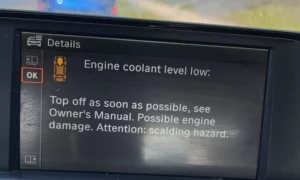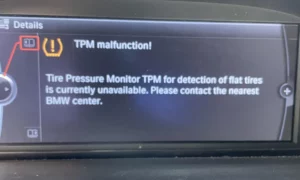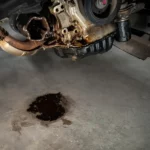Nobody wants to see their BMW’s dashboard light up with the “Engine Malfunction – Reduced Power” warning, especially when you’re on the go. This message means that there is an issue affecting engine performance, often linked to problems like fault codes or sensor issues. By understanding these underlying causes, you might solve your problem quickly. Keep reading to explore solutions and ensure your BMW runs smoothly again.
Causes of Reduced Power in BMW Engines
Understanding what causes reduced power in BMW engines can help you address these issues effectively. Key culprits often involve ignition malfunctions, fuel delivery problems, air and exhaust blockages, and timing errors, which impact performance and efficiency.
Ignition System Failures
Issues in the ignition system can severely reduce power. Faulty ignition coils are a common problem. They are responsible for supplying the spark plugs with electricity to ignite the fuel-air mixture in the engine. When they fail, expect misfires and rough idling. You might also notice a drop in fuel efficiency.
Damaged spark plugs can also contribute to power loss. They wear out over time, leading to weak sparks and incomplete combustion. If you notice sluggish acceleration, inspect your spark plugs first.
Another part to check is the Vanos solenoid, which controls the camshaft timing. If it fails, engine timing is affected, resulting in uneven power delivery and potential engine malfunction warnings.
Fuel System Issues
The fuel system plays a crucial role in providing the engine with the necessary fuel for combustion. A failing high-pressure fuel pump (HPFP) can lead to insufficient fuel flow. This often triggers reduced power and can even cause the engine to stall.
Vacuum leaks in the fuel lines can also cause problems. These leaks disrupt the fuel-to-air ratio, leading to inefficient combustion. Keep an eye out for hissing noises near the engine, which can indicate a vacuum leak.
Your BMW may also suffer from clogged fuel filters preventing adequate fuel delivery. It’s important to maintain regular service intervals to replace these filters and avoid potential power issues.
Air Intake and Exhaust Problems
Problems in this area can strangle engine performance. A malfunctioning mass air flow (MAF) sensor can give incorrect air data to the engine control unit. This causes poor fuel management and reduced power.
A clogged catalytic converter can limit exhaust flow and lead to poor acceleration and reduced engine efficiency. The restriction forces the engine to work harder, often triggering a fault light.
Turbocharger issues, like a stuck wastegate, can prevent your vehicle from getting the proper boost pressure. This results in less power and hesitation during acceleration. Ensure the turbo components are inspected regularly for any sign of wear or damage.
Engine Timing and Performance
Proper engine timing ensures the right balance and sequence for power delivery. The Vanos system is vital here, adjusting camshaft timing for better efficiency and performance. A fault in this system can lead to delayed responses and sluggish power.
Issues with the Valvetronic system, which manages valve lift, can also result in power loss. It’s essential to keep these systems calibrated and free of malfunctions.
Pay attention to any abnormal engine behavior. Timely diagnostics and repairs can prevent long-term damage and maintain optimal engine performance.
Electrical Components and Battery
In your BMW, issues with the battery and electrical components can often lead to a reduced engine power warning. These problems can affect the vehicle’s performance, sometimes due to software glitches or the need for updates.
Battery Health and Electrical Issues
Keeping your BMW’s battery in good condition is important for smooth operation. A weak battery can cause the car to lose power, making it hard to start and dimming the headlights. Regular checks can prevent these issues and help maintain battery health.
Your car’s engine control unit (ECU) relies on a stable power supply. If the battery is weak, the ECU might not function properly, leading to fault codes and warning messages about reduced power. This can make your car go into limp mode, reducing its performance.
Inspecting the battery connections and the wiring harness for any damage can also help. Loose or corroded connections may cause electrical problems that affect the reduced engine power warning.
The Impact of Software on Vehicle Performance
Sometimes, the reduced engine power warning might be related to software issues. Your vehicle’s software controls many of its functions, including the engine’s performance.
A software glitch can trigger warnings or cause the engine to run less efficiently. Keeping the software updated can solve these problems. A software update might improve your vehicle’s performance and prevent unnecessary warnings.
Regularly checking for updates ensures your car’s systems are running smoothly. If experiencing continuous problems, consulting with a professional can help diagnose any software-related issues, ensuring your BMW functions at its best.
Mechanical Failures and Their Consequences
Mechanical failures in BMW engines can lead to reduced power and possibly serious damage if not addressed. Common issues involve components like the turbo, Vanos system, timing chain, and valve train. Understanding these parts can help you maintain your car effectively.
Turbo and Vanos System Faults
If your BMW’s turbo system fails, you might experience a significant drop in power. Problems in the turbocharger can be due to worn-out bearings or oil blockages that prevent proper lubrication. It’s important to listen for unusual noises or notice smoke from the exhaust, as these could be signs of turbo trouble. Timely repair can prevent more costly damage.
The Vanos system controls the variable valve timing in many BMW engines. If the Vanos solenoid malfunctions, it can lead to rough idling or reduced engine performance. It’s crucial to identify signs like poor fuel efficiency or engine knocking. Replacing the faulty Vanos solenoid can restore performance and efficiency, ensuring your BMW runs smoothly.
Timing Chain and Valve Train Problems
A timing chain connects the crankshaft to the camshaft. Timing chain failure can lead to serious engine damage, as precise timing is crucial for the engine’s operation. Symptoms of a failing timing chain include rattling noises and poor engine performance. Repairing a timing chain issue promptly can save you from more severe engine problems.
The valve train, including the faulty valvetronic system, regulates the opening and closing of engine valves. If there’s a problem with the valvetronic system, it may cause loss of power or engine light warnings. Regular inspections and maintenance of the valve train are key to preventing these issues and keeping your BMW performing at its best.
Drivetrain and Transmission Concerns
The drivetrain and transmission are essential for your BMW’s performance. These components, if malfunctioning, can lead to reduced power and disrupt your driving experience. Recognizing issues early can prevent further damage and ensure your car runs smoothly.
Transmission Function and Errors
The transmission in your BMW is responsible for shifting gears smoothly. Transmission problems can arise from worn-out parts, low fluid levels, or electronic faults. These issues might cause strange noises or difficulties when changing gears. If your engine starts stalling or enters Limp Home Mode, it indicates severe problems that need immediate attention. Regular maintenance, like checking fluid levels and changing filters, can help prevent many of these issues. Ignoring transmission errors may lead to costly repairs.
Drivetrain Warning Indications
When there’s an issue with the drivetrain, you might see a drivetrain malfunction warning light on your dashboard. This can signify problems with components like the driveshaft or differential. These parts work together to deliver power from the transmission to the wheels. Problems can affect fuel efficiency and overall vehicle performance. If you notice a warning or experience reduced power, it’s crucial to drive moderately and seek professional assistance. Addressing drivetrain concerns early ensures your car remains reliable and safe to drive.
Monitoring and Protecting Your Engine’s Health
Keeping your BMW engine in good condition involves routine checks and prompt action on warning signs. By focusing on maintenance and following alerts, you can avoid potential problems like rough idle and overheating.
Regular Maintenance and Early Detection
Regular maintenance is crucial for your engine’s health. Stick to your BMW’s maintenance schedule to avoid issues like engine damage and overheating. Make sure to routinely check and replace components like spark plugs and air filters, which can impact the air-fuel mixture and throttle response.
Listen for unusual engine noise. Catching these early can prevent serious problems. Pay attention to rough idle or changes in fuel economy. Increased emissions might signal the need for more involved repairs, which regular check-ups can prevent.
Responding to Reduced Power Warnings
When you see a “Reduced Engine Power” message, the car has likely triggered limp mode to limit damage by reducing power. Act quickly to diagnose the issue. Using an OBD-II scanner can help identify the problem. Address the root cause to restore full functionality and avoid further complications like engine damage.
Check for overheating signs and changes in throttle response. Quick action helps in maintaining your vehicle’s fuel economy. Ignoring the warning might lead to bigger issues. For more insights, examine specific problems using tools like a BMW scanner to read fault codes effectively.













